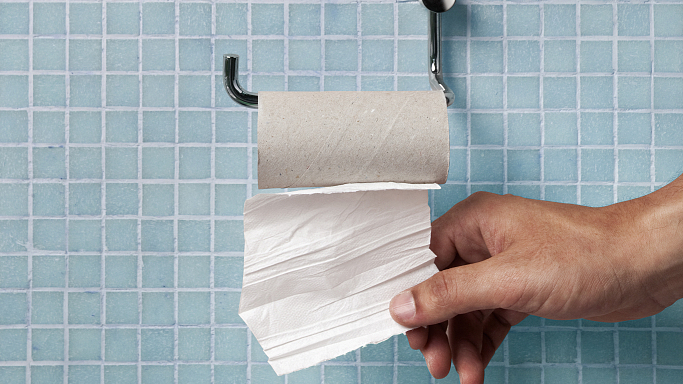
(Photo: CGTN)
As news of COVID-19 spread across the globe, panic buying ensued in many places, with people clearing supermarket shelves of items like masks, hand sanitizers, disinfectant, and most bewilderingly – toilet paper.
The toilet paper buying frenzy allegedly first started in Hong Kong, where there were fears of toilet paper shortage as factories on the Chinese mainland may be shut due to the COVID-19 outbreak.
It then spread to other countries like Australia, UK, and Singapore, where leaders had to call for calm and supermarkets started rationing the sale of toilet paper, as toilet paper manufacturers assured consumers they had more than a square to spare.
Panic buying may seem like an irrational behavior, but consumer behavior experts say these actions are "predictably irrational" as it is about regaining a sense of control for people living in an uncertain time.
"For people who are experiencing this psychological state of loss of control and uncertainty and of fear, it's rational for them. They will do whatever it takes to reduce this sensation of not being in control and to regain control again," said Andy Yap, assistant professor of Organisational Behaviour at INSEAD to CGTN.
"The fact that they're worried that they won't be able to get the toilet paper they need is the immediate thing that they want to solve," added Charlene Chen, assistant professor, Marketing Division at Nanyang Business School.
Social media and herd mentality
This hoarding mentality is also exacerbated by copy-cat behaviors – or herd mentality – and the widespread proliferation of misinformation and pictures on social media.
With the growing severity of the outbreak, there already is an increased number of people headed to the supermarket to stock up on tinned food, water, and other daily necessities in case they need to prepare for quarantine.
"I've walked past shoppers holding sometimes ten boxes of tissues," said Hansen Ding, an Australian citizen in Sydney, who mainly shops at night, adding "every supermarket is definitely out of toilet paper. And not only toilet paper but we're frequently running low or in extreme cases being out of paper towels, tissue paper, as well as products like rice, flour, canned goods etc.."
While they may not have gone with the intention of buying excessive rolls of toilet paper, seeing people with a mountain of toilet paper in their baskets may prompt others to do the same.
"You see a whole bunch of people just grabbing as many rolls of toilet paper as possible, you start doing it yourself as you are wondering what's happening," said Yap.
The world is also more connected now with social media, where information and images spread quickly. And these images have a big impact on buying behavior, creating an "echo chamber" that can ripple beyond a physical store.
Winning the psychological battle
To offset this behavior, Yap and Chen said having transparent information from governments displaying they have a sense of control over the situation, and assuring sufficient supplies are available are essential to placate public anxiety.
"A time of crisis is where you don't need a discussion about how to get things done. You basically want people to give you clear norms and ways to get things done so that everyone is safe for the greater good," Yap said.
It also pays to be prepared, which is as much a state of mind as being prepared, said Irwin Redlener, director of the National Center for Disaster Preparedness at Columbia University.
"Everything's ready, something happens and I have to be quarantined, I know I'm good to go. Waiting till the last second, being highly anxious are the things that are going to provoke really serious anxiety and can be problems that we will need to try to try to alleviate this in advance," explained Redlener.
Stock up what you need for...14 days
With panic buyers stocking up toilet papers enough to last more than a year, Redlener said there is no need to go overboard but to simply think about what you need in the event of a house quarantine, and 14 days is a reasonable benchmark.
Beyond food and water supplies for two weeks, medication, especially for the chronically ill, should be top of the list for people. It is also "worth thinking about the details of your particular life," beyond general recommendations.
"If you have to stay in the house for two weeks, you're gonna have to do it. And all the other thing is that for our family, we would have, books and games for the children. We'd have we'd have the things we think about what we do every day," Redlener elaborated, adding that families with pets need to consider their needs as well.
The COVID-19 outbreak has now spread to over 70 countries, including China, with more 100,000 infections. As the virus shows no signs of slowing, it may do well to take stock of supplies at home, but make responsible purchases to ensure there's enough for everyone.


